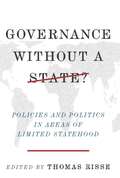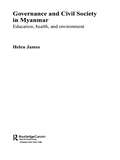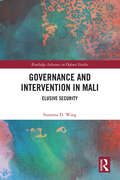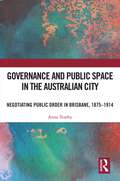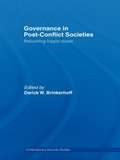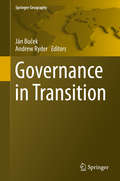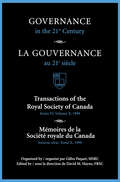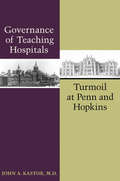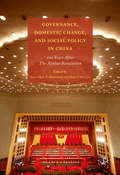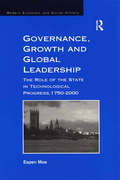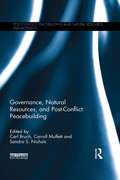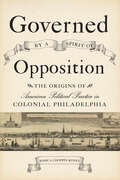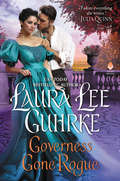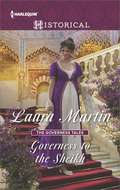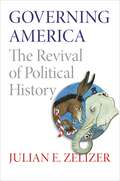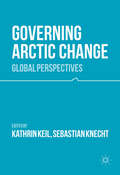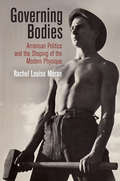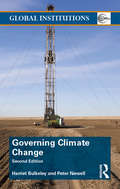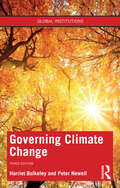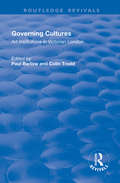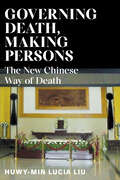- Table View
- List View
Governance Without a State? Policies and Politics in Areas of Limited Statehood
by Thomas RisseGovernance discourse in development agencies and the social sciences remains centered on an "ideal type" of modern statehood one that exhibits full internal and external sovereignty and a legitimate monopoly on the use of force. Yet modern statehood remains an anomaly both historically and in the contemporary international system while the condition of "limited statehood " wherein countries lack the capacity to implement central decisions and monopolize force is the norm. Limited statehood argue the authors in this provocative collection is in fact a fundamental form of governance immune to the forces of economic and political modernization ushered in by globalization. Challenging common assumptions about sovereign states and the evolution of modern statehood particularly the dominant paradigms supported by international relations theorists development agencies and international organizations this volume explores strategies for effective and legitimate governance within a framework of weak and ineffective state institutions. Approaching the problem from the perspective of political science history and law contributors explore the factors that contribute to successful governance under conditions of limited statehood such as the involvement of nonstate actors and non-hierarchical modes of political influence. Empirical chapters analyze among other issues security governance by nonstate actors the contribution of public-private partnerships to promote the United Nations Millennium Goals the role of business in environmental governance and the problems of Western state-building efforts. Recognizing these forms of governance as themselves legitimate this collection unravels the complexities of a system that the developed world must negotiate in the coming century.
Governance Without a State?: Policies and Politics in Areas of Limited Statehood (The\art Of The State Ser. #8)
by Ed. Thomas RisseGovernance discourse centers on an "ideal type" of modern statehood that exhibits full internal and external sovereignty and a legitimate monopoly on the use of force. Yet modern statehood is an anomaly, both historically and within the contemporary international system, while the condition of "limited statehood," wherein countries lack the capacity to implement central decisions and monopolize force, is the norm. Limited statehood, argue the authors in this provocative collection, is in fact a fundamental form of governance, immune to the forces of economic and political modernization.Challenging common assumptions about sovereign states and the evolution of modern statehood, particularly the dominant paradigms supported by international relations theorists, development agencies, and international organizations, this volume explores strategies for effective and legitimate governance within a framework of weak and ineffective state institutions. Approaching the problem from the perspectives of political science, history, and law, contributors explore the factors that contribute to successful governance under conditions of limited statehood. These include the involvement of nonstate actors and nonhierarchical modes of political influence. Empirical chapters analyze security governance by nonstate actors, the contribution of public-private partnerships to promote the United Nations Millennium Goals, the role of business in environmental governance, and the problems of Western state-building efforts, among other issues. Recognizing these forms of governance as legitimate, the contributors clarify the complexities of a system the developed world must negotiate in the coming century.
Governance and Civil Society in Myanmar: Education, Health and Environment (Routledge Contemporary Southeast Asia Series #Vol. 3)
by Helen JamesMost international attention on Myanmar has focused on the political situation, where the military, in power since 1962, continues to refuse to acknowledge the results of democratic elections, and on related human rights issues. This book, by focusing on education, health and environment, and on the institutions which formulate and deliver policy in these fields, shows how the international community can make a significant difference to strengthening Myanmar's civil society and to supporting a future democratic form of government, by encouraging institutional developments in these fields. Such developments in turn, the author argues, will re-skill the younger generation, promote economic development and poverty alleviation, and, through a participatory approach to policy-making, nurture the conditions from which democracy will grow.
Governance and Intervention in Mali: Elusive Security (Routledge Advances in Defence Studies)
by Susanna D. WingThis book provides the historical and political context for the security interventions in Mali over the past three decades. The work contextualizes external military engagement (including that of the United States, France, the United Nations and G5 Sahel) within the broader framework of weak democratic consolidation, unmet development goals and increasing popular perceptions of widespread corruption in Mali. Over the past three decades, there have been four military coups in Mali: the military coup in 1991 launched the Third Republic; the 2012 coup toppled elected President Touré; the 2020 coup overthrew the elected President Keita; and the coup within a coup that ousted transitional President Bah. Given the political context, how do multiple international interventions relate to insecurity and instability in the country? Drawing on the author’s thirty years of research on Mali, this work examines the relationship between external intervention in the country, domestic actors, and decentralization policies. The book argues that external support has ignored the poor governance that is at the heart of the country’s crises. This book will be of much interest to students of intervention and statebuilding, African politics and International Relations in general.
Governance and Intervention in Mali: Elusive Security (Routledge Advances in Defence Studies)
by Susanna D. WingThis book provides the historical and political context for the security interventions in Mali over the past three decades.The work contextualizes external military engagement (including that of the United States, France, the United Nations and G5 Sahel) within the broader framework of weak democratic consolidation, unmet development goals and increasing popular perceptions of widespread corruption in Mali. Over the past three decades, there have been four military coups in Mali: the military coup in 1991 launched the Third Republic; the 2012 coup toppled elected President Touré; the 2020 coup overthrew the elected President Keita; and the coup within a coup that ousted transitional President Bah. Given the political context, how do multiple international interventions relate to insecurity and instability in the country? Drawing on the author’s thirty years of research on Mali, this work examines the relationship between external intervention in the country, domestic actors, and decentralization policies. The book argues that external support has ignored the poor governance that is at the heart of the country’s crises.This book will be of much interest to students of intervention and statebuilding, African politics and International Relations in general.
Governance and Policy in Sport Organizations (2nd edition)
by Mary A. Hums Joanne MacleanHums (U. of Louisville) and MacLean (Brock U.) provide a textbook for undergraduate and graduate students on the fundamentals of sport governance and its relationship to current policies and ethical issues facing sport managers. It covers managerial activities relating to governance and policy development and the specific governance structures of sport industry segments. In this edition, websites are included, case studies have been added, and new material on how North American high school, intercollegiate, and professional sports programs differ from other countries is provided. Sections on current policy have been updated, with discussion of topics such as recruitment, the use of technology in paralympic sport, and racism in European football. Other new sections cover vision statements, using parliamentary procedure, and the structures of the YWCA, Jewish community centers, and Historically Black Colleges and Universities. Annotation ©2008 Book News, Inc., Portland, OR (booknews.com)
Governance and Public Space in the Australian City: Negotiating Public Order in Brisbane, 1875-1914
by Anna TembyGovernance and Public Space in the Australian City is a rich and evocative examination of the production and use of public spaces in Australian cities in the late-nineteenth and early-twentieth centuries. Using Brisbane as a case study, it demonstrates the way public spaces were constructed, contested, and controlled in attempts to create ‘ideal’ city spaces. This construction of space is considered not just in the literal and material sense but also as a product of aspirational and imaginative processes of city-building by municipal authorities and citizens. This book is as much about people as it is about cities – uncovering the manner in which perceived models of ideal urban citizenship were reflected in the production and ordering of city spaces. This book challenges common narratives that situate public spaces as universal or equalising aspects of the urban sphere. Exploring three distinct types of public space – the streets, slums, and parks – the book questions how urban spaces functioned, alongside how they were intended to function. In so doing, Governance and Public Space in the Australian City situates public spaces as products of manipulation and regulation at odds with broader concepts of individual liberty and the ‘rights’ of people to public space. It will be illuminating reading for scholars and students of urban history and Australian history.
Governance in Post-Conflict Societies: Rebuilding Fragile States (Contemporary Security Studies)
by Derick W. BrinkerhoffForeword Frederick D. Barton Preface Derick W. Brinkerhoff 1. Governance Challenges in Fragile States: Re-Establishing Security, Rebuilding Effectiveness, and Reconstituting Legitimacy Derick W. Brinkerhoff Part 1. Governance and Post-conflict: Perspectives on Core Issues 2. Does Nation Building Work? Reviewing the Record Arthur A. Goldsmith 3. Constitutional Design, Identity and Legitimacy in Post-Conflict Reconstruction Aliza Belman Inbal and Hanna Lerner 4. Election Systems and Political Parties in Post-Conflict and Fragile States Eric Bjornland, Glenn Cowan, and William Gallery 5. Democratic Governance and the Security Sector in Conflict-affected Countries Nicole Ball Part 2. Actors in Governance Reconstruction: Old, New, and Evolving Roles 6. From Bullets to Ballots: The U.S. Army Role in Stability and Reconstruction Operations Tammy S. Schultz and Susan Merrill 7. The Private Sector and Governance in Post-Conflict Societies Virginia Haufler 8. Rebuilding and Reforming Civil Services in Post-Conflict Societies Harry Blair 9. Contributions of Digital Diasporas to Governance Reconstruction in Fragile States: Potential and Promise Jennifer M. Brinkerhoff Part 3. Reforming and Rebuilding Governance: Focus on the Local 10. Decentralization, Local Governance, and Conflict Mitigation in Latin America Gary Bland 11. Subnationalism and Post-conflict Governance: Lessons from Africa Joshua B. Forrest 12. Subnational Administration and State Building: Lessons from Afghanistan Sarah Lister and Andrew Wilder About the Contributors Index
Governance in Transition
by Ján Buček Andrew RyderThis book looks at experience in government restructuring and devolution from a variety of national and international perspectives, both within the European Union and elsewhere, focusing on lessons learned and ways forward. Since the 1980s, there has been a global trend to give more power to local governments. Even in Korea and the United Kingdom, the most centralised countries in the OECD, local government powers have increased, with substantial economic benefits. Within the European Union, the principle of subsidiarity has enshrined the idea of devolution. New member states, particularly in central and eastern Europe, have significantly created new and self-sufficient local and regional governments. However, this process has been complicated. Devolution is not a panacea in its own right, and need not lead to economic growth. While it can encourage savings through collaboration, it can also lead to confused lines of authority and can complicate policy formation and implantation. Devolution can strain local budgets, forcing local governments to rely on their own sources of finance, rather than central government transfers. Suburbanisation, rural depopulation, the growth of some regions, and the decline of others have raised new problems, particularly related to inter-governmental cooperation among local governments and different levels of government. In many cases, an increased number of governments has increased administrative costs.
Governance in the 21st Century / Gouvernance Au 21e Siècle
by David M. HayneThis volume continues the inquiry launched by the Royal Society of Canada's 1997 publication, "Can Canada Survive? Under What Terms and Conditions?", and pursued in the 1998 volume, "The Well-Being of Canada", and the 1999 volume "Survivability in the 21st Century" (all published by the University of Toronto Press). The present collection examines the challenges of governance in our new century.Eight papers, given by experts in their respective fields, call for an examination of the governance of organizations per se, whether one probes the crises in the experience of large corporations, in education, in health care, in science and technology systems, or in military affairs.This volume underlines the dramatic changes taking place in our time and stresses the urgent need for new thinking and the need to reform our governance mechanisms in order to keep pace with our changing world.
Governance of Teaching Hospitals: Turmoil at Penn and Hopkins
by John A. KastorWhat forces lead to changes in governance among medical schools and their associated teaching hospitals? To what extent do such changes affect how well those schools and hospitals do their work? In this book, John A. Kastor, M.D., focuses on the academic medical centers of the University of Pennsylvania and the Johns Hopkins University, two institutions that underwent dramatic change in governance during the late 1990s.Drawing on extensive interviews with more than three hundred administrators, physicians, and other medical professionals at Penn, Hopkins, and elsewhere, Kastor identifies the factors that influenced changes in governance at these two institutions. Chief among these, he finds, are structure, personality conflicts, and current events. This book will be of interest to administrators of teaching hospitals as well as professionals in health policy and management.
Governance, Domestic Change, and Social Policy in China: 100 Years after the Xinhai Revolution
by Jean-Marc F. Blanchard and Kun-Chin LinThis book constitutes the first comprehensive retrospective on one hundred years of post-dynastic China and compares enduring challenges of governance in the period around the collapse of the Qing dynasty in 1911 to those of contemporary China. The authors examine three key areas of domestic change and policy adaptation: social welfare provision, local political institutional reform, and social and environmental consequences of major infrastructure projects. Demonstrating remarkable parallels between the immediate post-Qing era and the recent phase of Chinese reform since the late-1990s, the book highlights common challenges to the political leadership by tracing dynamics of state activism in crafting new social space and terms of engagement for problem-solving and exploring social forces that continue to undermine the centralizing impetus of the state.
Governance, Growth and Global Leadership: The Role of the State in Technological Progress, 1750–2000 (Modern Economic and Social History)
by Espen MoeThis book focuses on the role of the state in promoting a country's long-term technological progress and industrial leadership. Throughout history, a nation's rise to dominance has invariably been followed by its fall; the dominant powers of today are not the same ones that controlled the world three hundred years ago. In the same manner, economic dominance has usually been fleeting, as leading nations have routinely been caught up and surpassed by challengers. This study looks at Schumpeterian growth - currently the most important source of economic growth - which credits the ability to use technological progress for the benefit of industrial leadership as the key motor of national development and economic success. Contrasting the experiences of five great powers (Britain, France, Germany, the USA and Japan) during five periods of technological and industrial leadership, from the Industrial Revolution to the beginning of the twenty-first century, the book draws on historical and comparative methods to draw causal inferences about international progress and leadership. It explores various factors that promote or hinder technological advancement and how these can in turn effect national development. It concludes that where states have forged ahead and maintained a lead over their rivals, it is because consensus and cohesion prevented vested interests from growing powerful enough to block structural economic change. By applying economic theory to long-term historical models, this book offers a fascinating perspective on the causes and effects of national growth and industrial leadership. It will be invaluable reading for anyone with an interest in international relations and global economic trends, both modern and historical.
Governance, Natural Resources and Post-Conflict Peacebuilding (Post-Conflict Peacebuilding and Natural Resource Management)
by Carl Bruch Carroll Muffett Sandra S. NicholsWhen the guns are silenced, those who have survived armed conflict need food, water, shelter, the means to earn a living, and the promise of safety and a return to civil order. Meeting these needs while sustaining peace requires more than simply having governmental structures in place; it requires good governance. Natural resources are essential to sustaining people and peace in post-conflict countries, but governance failures often jeopardize such efforts. This book examines the theory, practice, and often surprising realities of post-conflict governance, natural resource management, and peacebuilding in fifty conflict-affected countries and territories. It includes thirty-nine chapters written by more than seventy researchers, diplomats, military personnel, and practitioners from governmental, intergovernmental, and nongovernmental organizations. The book highlights the mutually reinforcing relationship between natural resource management and good governance. Natural resource management is crucial to rebuilding governance and the rule of law, combating corruption, improving transparency and accountability, engaging disenfranchised populations, and building confidence after conflict. At the same time, good governance is essential for ensuring that natural resource management can meet immediate needs for post-conflict stability and development, while simultaneously laying the foundation for a sustainable peace. Drawing on analyses of the close relationship between governance and natural resource management, the book explores lessons from past conflicts and ongoing reconstruction efforts; illustrates how those lessons may be applied to the formulation and implementation of more effective governance initiatives; and presents an emerging theoretical and practical framework for policy makers, researchers, practitioners, and students. Governance, Natural Resources, and Post-Conflict Peacebuilding is part of a global initiative to identify and analyze lessons in post-conflict peacebuilding and natural resource management. The project has generated six books of case studies and analyses, with contributions from practitioners, policy makers, and researchers. Other books in this series address high-value resources, land, water, livelihoods, and assessing and restoring natural resources.
Governed by a Spirit of Opposition: The Origins of American Political Practice in Colonial Philadelphia (Studies in Early American Economy and Society from the Library Company of Philadelphia)
by Jessica Choppin RoneyCivic engagement in the City of Brotherly Love gave birth to the American Revolution.Winner of the Athenaeum of Philadelphia Literary Award of The Athenaeum of PhiladelphiaDuring the colonial era, ordinary Philadelphians played an unusually active role in political life. Because the city lacked a strong central government, private individuals working in civic associations of their own making shouldered broad responsibility for education, poverty relief, church governance, fire protection, and even taxation and military defense. These organizations dramatically expanded the opportunities for white men—rich and poor alike—to shape policies that immediately affected their communities and their own lives. In Governed by a Spirit of Opposition, Jessica Choppin Roney explains how allowing people from all walks of life to participate in political activities amplified citizen access and democratic governance. Merchants, shopkeepers, carpenters, brewers, shoemakers, and silversmiths served as churchwardens, street commissioners, constables, and Overseers of the Poor. They volunteered to fight fires, organized relief for the needy, contributed money toward the care of the sick, took up arms in defense of the community, raised capital for local lending, and even interjected themselves in Indian diplomacy. Ultimately, Roney suggests, popular participation in charity, schools, the militia, and informal banks empowered people in this critically important colonial city to overthrow the existing government in 1776 and re-envision the parameters of democratic participation. Governed by a Spirit of Opposition argues that the American Revolution did not occasion the birth of commonplace political activity or of an American culture of voluntary association. Rather, the Revolution built upon a long history of civic engagement and a complicated relationship between the practice of majority-rule and exclusionary policy-making on the part of appointed and self-selected constituencies.
Governess Brides Bundle
by Julia Byrne Paula Marshall Sylvia Andrew Diane GastonRogues and rakes, society and scandal, babes born out of wedlock and old family secrets...all play a part in these tantalizing tales of passion, betrayal and honor, in which four feisty, independent women claim their place in society and in the arms of the men they love. Bundle includes A Very Unusual Governess by Sylvia Andrew, An Unconventional Duenna by Paula Marshall, Scandal and Miss Smith by Julia Byrne, and a special bonus, the short story A Twelfth Night Tale by Diane Gaston.
Governess Gone Rogue: Dear Lady Truelove (Dear Lady Truelove #3)
by Laura Lee GuhrkeDear Lady Truelove . . .My twin brother and I need a new mother, though Papa insists he’ll never marry again. Must be nice, brainy, and fond of cats . . .Lady Truelove may be London’s most famous advice columnist, but James St. Clair, the Earl of Kenyon, knows his wild young sons need a tutor, not a new mother. They need a man tough enough to make his hellions tow the line, and James is determined to find one.Miss Amanda Leighton, former schoolteacher and governess, knows she has all the qualifications to be a tutor. And while female tutors are unheard of, Amanda isn’t about to lose the chance at her dream job because of pesky details like that. If Lord Kenyon insists on hiring a man, then she has only one option . . .Jamie isn’t sure what to make of his new employee, until he realizes the shocking truth—beneath the ill-fitting suits, his boys’ tutor is a woman. An unconventional, outspoken, thoroughly intriguing woman. Despite Amanda’s deception, he can’t dismiss her when his boys are learning so much. Yet Jamie, too, is learning surprising lessons—about desire, seduction, and passionate second chances . . .
Governess to the Sheikh (The Governess Tales #2)
by Laura MartinIn a land far, far away... Her entire life, Rachel Talbot has dreamed of faraway lands. So when she's offered a job as governess to the Sheikh of Huria's children, it seems as if all her dreams are coming true... But Sheikh Malik turns out to be infuriating! Yes, he's the most handsome man Rachel has ever seen, but he's also autocratic and aloof. Until, that is, a night under the starry desert sky leads to a passionate kiss... And suddenly a whole new world of possibilities opens up to this intrepid governess!
Governing America: The Revival of Political History
by Julian E. ZelizerNew perspectives on American political history from one of its leading writersIn recent years, the study of American political history has experienced a remarkable renaissance. After decades during which the subject fell out of fashion and disappeared from public view, it has returned to prominence as the study of American history has shifted its focus back to politics broadly defined. In this book, one of the leaders of the resurgence in American political history, Julian Zelizer, assesses its revival and demonstrates how this work not only illuminates the past but also helps us better understand American politics today.
Governing Arctic Change
by Kathrin Keil Sebastian KnechtThis volume explores the governance of the transforming Arctic from an international perspective. Leading and emerging scholars in Arctic research investigate the international causes and consequences of contemporary Arctic developments, and assess how both state and non-state actors respond to crucial problems for the global community. Long treated as a remote and isolated region, climate change and economic prospects have put the Arctic at the forefront of political agendas from the local to the global level, and this book tackles the variety of involved actors, institutional politics, relevant policy issues, as well as political imaginaries related to a globalizing Arctic. It covers new institutional forms of various stakeholder engagement on multiple levels, governance strategies to combat climate change that affect the Arctic region sooner and more strongly than other regions, the pros and cons of Arctic resource development for the region and beyond, and local and trans-boundary pollution concerns. Given the growing relevance of the Arctic to international environmental, energy and security politics, the volume helps to explain how the region is governed in times of global nexuses, multi-level politics and multi-stakeholderism.
Governing Bodies: American Politics and the Shaping of the Modern Physique (Politics and Culture in Modern America)
by Rachel Louise MoranAmericans are generally apprehensive about what they perceive as big government—especially when it comes to measures that target their bodies. Soda taxes, trans fat bans, and calorie counts on menus have all proven deeply controversial. Such interventions, Rachel Louise Moran argues, are merely the latest in a long, albeit often quiet, history of policy motivated by economic, military, and familial concerns. In Governing Bodies, Moran traces the tension between the intimate terrain of the individual citizen's body and the public ways in which the federal government has sought to shape the American physique over the course of the twentieth century.Distinguishing her subject from more explicit and aggressive government intrusion into the areas of sexuality and reproduction, Moran offers the concept of the "advisory state"—the use of government research, publicity, and advocacy aimed at achieving citizen support and voluntary participation to realize social goals. Instituted through outside agencies and glossy pamphlets as well as legislation, the advisory state is government out of sight yet intimately present in the lives of citizens. The activities of such groups as the Civilian Conservation Corps, the Children's Bureau, the President's Council on Physical Fitness, and the Special Supplemental Nutrition Program for Women, Infants, and Children (WIC) implement federal body projects in subtle ways that serve to mask governmental interference in personal decisions about diet and exercise. From advice-giving to height-weight standards to mandatory nutrition education, these tactics not only empower and conceal the advisory state but also maintain the illusion of public and private boundaries, even as they become blurred in practice.Weaving together histories of the body, public policy, and social welfare, Moran analyzes a series of discrete episodes to chronicle the federal government's efforts to shape the physique of its citizenry. Governing Bodies sheds light on our present anxieties over the proper boundaries of state power.
Governing Climate Change (Global Institutions)
by Harriet Bulkeley Peter NewellGoverning Climate Change, Second Edition, provides a short and accessible introduction to how climate change is governed by an increasingly diverse range of actors, from civil society and market actors to multilateral development banks, donors, and cities. This updated edition also includes: up-to-date coverage of the negotiations post-Copenhagen (Cancun, Durban, and towards Paris) and some of the shifts in the inter-governmental politics; a deeper discussion of the roles of actors that have come to prominence in the climate negotiations; an overview of the key funding mechanisms such as the Green Climate Fund, Adaptation Fund, the High-Level Advisory Group on Climate Change Finance, and REDD (Reducing Emissions from Deforestation and forest Degradation); a direct assessment of what the proliferation of TCCG (Transnational Climate Change Governance) adds up to in terms of legitimacy, effectiveness etc., drawing on all the recent research in this area; an analysis of renewable energy in the UK (in the light of recent controversies around the siting of wind turbines and fracking projects). Providing an interdisciplinary perspective drawing on geography, politics, international relations, and development studies, this book is essential reading for students and scholars concerned not only with the climate governance but with the future of the environment in general.
Governing Climate Change (Global Institutions)
by Harriet Bulkeley Peter NewellThis fully revised and expanded new edition provides a short and accessible introduction to how climate change is governed by an increasingly diverse range of actors, from civil society and business actors to multilateral development banks, donors, and cities. The issue of global climate change has risen to the top of the international political agenda. Despite ongoing contestation about the science informing policy, the economic costs of action and the allocation of responsibility for addressing the issue within and between nations, it is clear that climate change will continue to be one of the most pressing and challenging issues facing humanity for many years to come. The book: Evaluates the role of states and non-state actors in governing climate change at multiple levels of political organization: local, national, and global Provides a discussion of theoretical debates on climate change governance, moving beyond analytical approaches focused solely on nation-states and international negotiations Examines a range of key topical issues in the politics of climate change Includes multiple examples from both the north and the global south Providing an inter-disciplinary perspective drawing on geography, politics, international relations, and development studies, this book is essential reading for all those concerned not only with the climate governance but with the future of the environment in general.
Governing Cultures: Art Institutions in Victorian London
by Colin TroddThis title was first published in 2000. London in the nineteenth century saw the founding of the National Gallery, the National Portrait Gallery, the Victoria and Albert Museum and the Whitechapel Art Gallery. Other, less permanent, organisations flourished, among them the British Institution, water-colour societies and the Society of Female Artists. These worked alongside the schools such as the Royal Academy and the Slade School of Art. In this volume, eleven scholars, experts on the individual institutions, analyse their complex histories to investigate such issues as: How did they generate and redesign their publics? What identities did they create? What practice of art making, connoisseurship and spectatorship did they enshrine? These reports elucidate the values associated with the key institutions and describe the responses and adaptation over time to major cultural developments: new movements, political change and the development of the Empire. The volume as a whole offers a fascinating account of the interconnections between these key institutions. Challenging conventional readings of the subject, the Introduction, by Paul Barlow and Colin Trodd, offers a definition of public art during the Victorian period.
Governing Death, Making Persons: The New Chinese Way of Death
by Huwy-min Lucia LiuGoverning Death, Making Persons tells the story of how economic reforms and changes in the management of death in China have affected the governance of persons. The Chinese Communist Party has sought to channel the funeral industry and death rituals into vehicles for reshaping people into "modern" citizens and subjects. Since the Reform and Opening period and the marketization of state funeral parlors, the Party has promoted personalized funerals in the hope of promoting a market-oriented and individualistic ethos. However, things have not gone as planned.Huwy-min Lucia Liu writes about the funerals she witnessed and the life stories of two kinds of funeral workers: state workers who are quasi-government officials and semilegal private funeral brokers. She shows that end-of-life commemoration in urban China today is characterized by the resilience of social conventions and not a shift toward market economy individualization. Rather than seeing a rise of individualism and the decline of a socialist self, Liu sees the durability of socialist, religious, communal, and relational ideas of self, woven together through creative ritual framings in spite of their contradictions.
